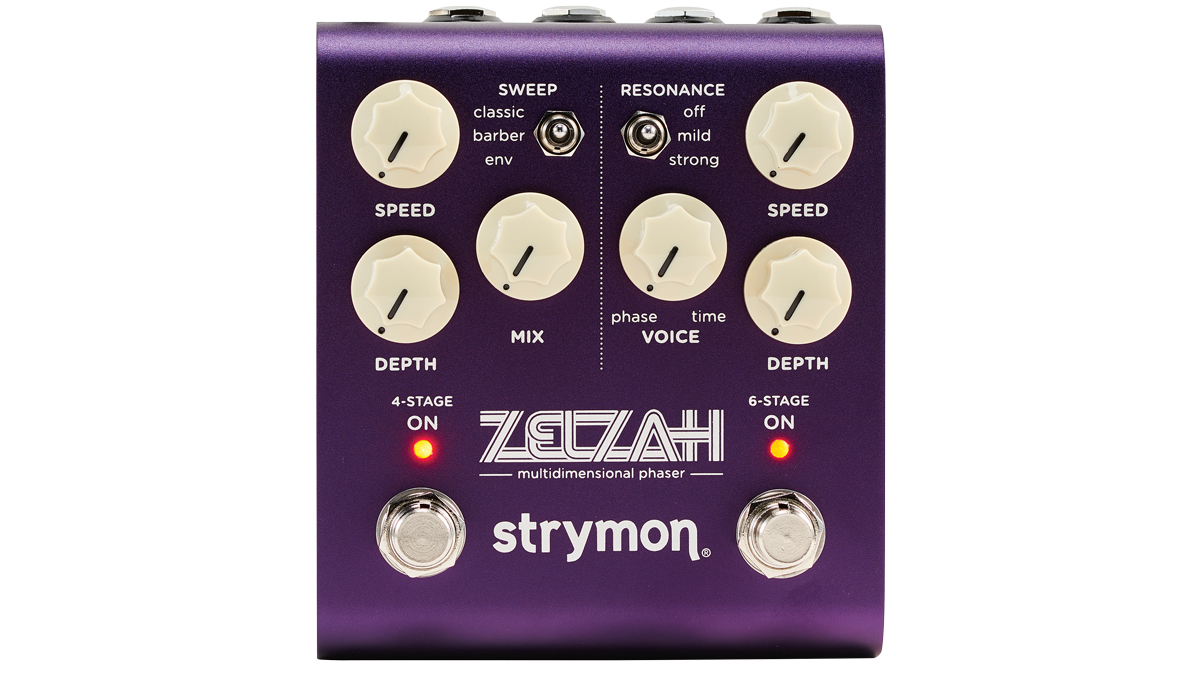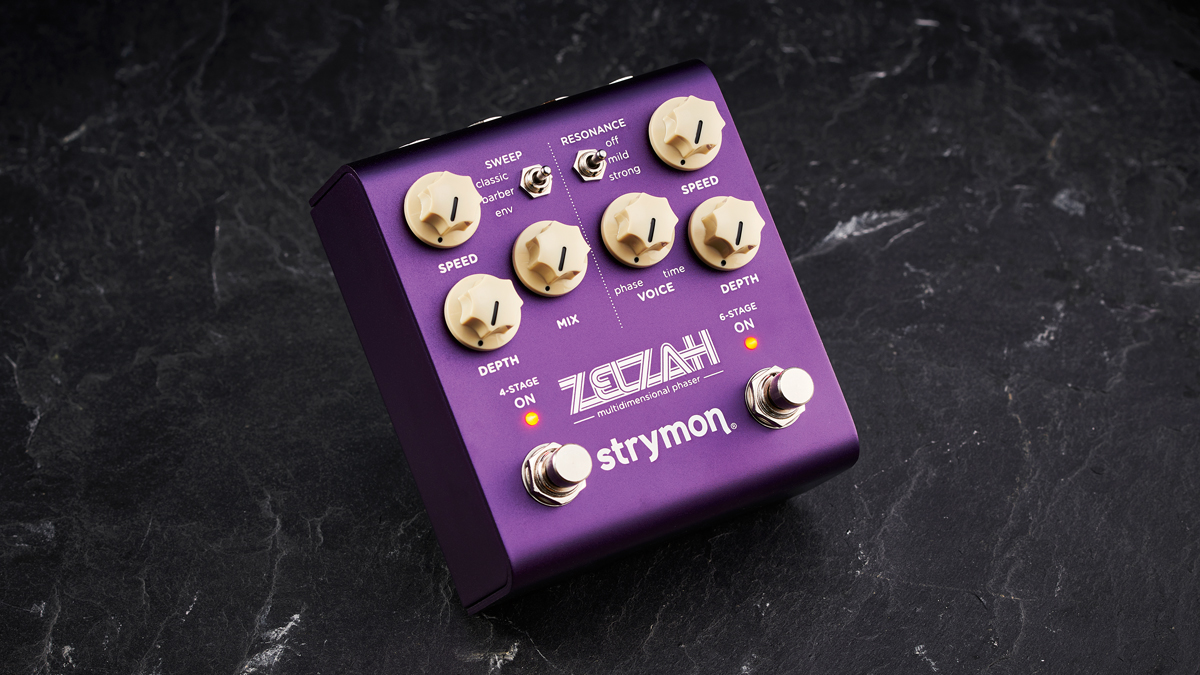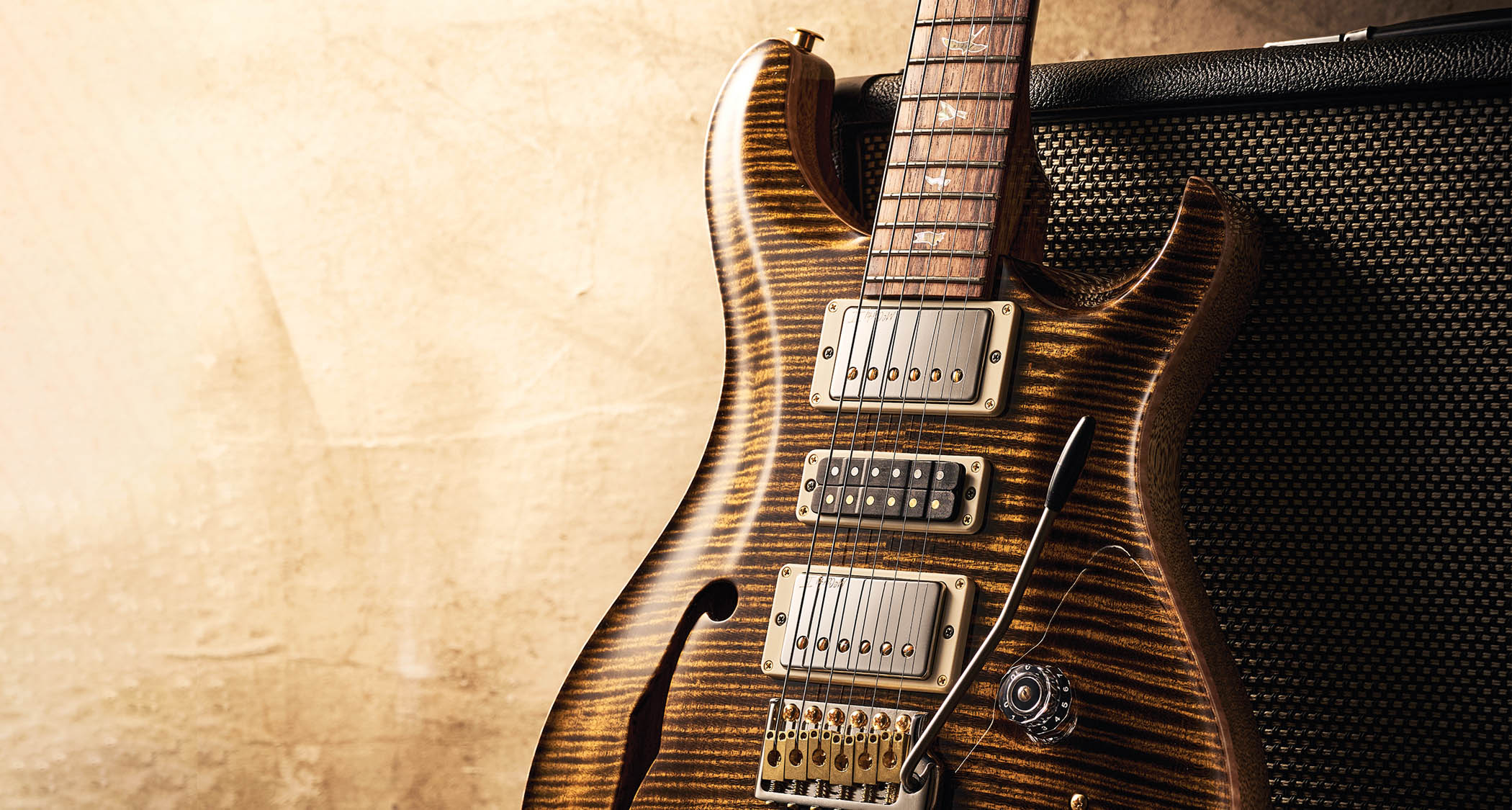Guitar World Verdict
This is one powerful modulation pedal that can both conjure up vintage sounds and provide a way to create new ones.
Pros
- +
Two great-sounding phasers in one box.
- +
Voice knob goes beyond pure phasing.
- +
Flexible output options.
- +
Preset storage.
Cons
- -
It would’ve been good to have access to at least one preset without having to plug in external equipment.
You can trust Guitar World
Looking at Strymon’s previous output, there must have been plenty of guitar players wondering when the company would produce a dedicated phaser pedal. And here it is in the very purple form of the Zelzah Multidimensional Phaser.
Not just a single phaser pedal, the Zelzah offers two separately footswitchable true stereo phasers in one chassis: one a four-stage phaser, the other six-stage. These can be run individually or simultaneously with various stereo and mono output options.
As with previous Strymon pedals, there is full MIDI implementation with access to 300 preset locations and the ability to add an expression pedal or footswitches.
Sounds
The left-hand side of the pedal is home to the four-stage phaser with three toggle-switched options, the first of which is Classic Sweep. Here, you can dial in various aspects of phasing with careful placement of the three knobs.
The Mix knob gradually mixes out the dry element of the signal, starting from a very mild phased sound and running through to the point where you get 100 per cent wet signal for vibrato sounds. Familiar 1970s phase pedal sounds are found at a 12 o’clock setting and you can adjust the Speed and Depth knobs to your taste.
Speed is wide ranging, going from 0.1Hz to 10Hz, which effectively means that at minimum the phase sweep will take 10 seconds to complete, while you’ll get a warble at the other extreme, which is like a rotary speaker on fast.
Meanwhile, if you’re looking to emulate some particular classic pedals then the Depth knob can set the character. We found a setting that matched our script logo MXR Phase 90 at about 10 o’clock and our Electro‑Harmonix Small Stone at around one o’clock.
All the latest guitar news, interviews, lessons, reviews, deals and more, direct to your inbox!
The second mode on the toggle switch is Barber Sweep, which has its own distinctive sonic signature where, instead of the traditional rising and falling, you can set a sweep that’s either continually rising or continually falling, “similar to the visual effect of a barber pole”, says Strymon.
The third of the three modes is an Envelope Phaser setting that’s available for a touch‑sensitive envelope phasing effect. Here, you can control the effect with your playing dynamics to conjure up quacky auto-wah-like stylings.
The six-stage phaser also has Speed and Depth knobs on the right-hand side of the pedal, but its toggle switch brings in different degrees of resonance where signal is fed back to the input for increased sonic intensity, offering a more pronounced vowel-like ‘wow’ to the sweep – like engaging the Color switch on a Small Stone.
In place of the Mix knob in this section you’ll find a Voice knob that introduces and gradually increases a time element into the mix, letting you get beyond phasing into flanging and then chorus territory. The added resonance comes in really useful here, delivering a very prominent flange sweep.

Things get really interesting when you use both sides of the pedal together and the various sonic options combine for some complex modulation, be that two phasers, phaser and flanger, or phaser and chorus.
By default, the effects are in series with the six-stage phaser feeding into the four-stage with your output in stereo or mono, but there are two other modes available for combinations.
One is a split mode, which sees the two sides as separate mono entities – the four-stage phaser going to the left output, the six-stage to the right. The other is a parallel mode with both phasers running side by side. This offers up a different vibe to series mode if you’re running a mono signal chain, but it can really become animated and dimensional in stereo because each phaser has its own independent stereo spread. This means that you can pan one effect narrowly in the centre and have a wide spread for the other, for example.
With all the options available from the pedal’s inherent flexibility, those 300 preset slots will definitely come in handy. But, really, you’ll need to embrace the MIDI functionality to have full access, or use Strymon’s single MiniSwitch for one favourite preset or the MultiSwitch Plus for access to three presets.
Verdict
Not all players will want a dedicated phaser pedal, many relying on the sort of multi-effects pedal that will ‘do’ phasing alongside other modulation effects. However, as phaser pedals go, you won’t go far wrong with the versatility that the Zelzah provides: two distinct phaser flavours and many ways to use them, as well as the flanging and chorus that you might have got in a multi-effects unit.
Specs
- ORIGIN: USA
- TYPE: Phaser pedal
- FEATURES: 4- and 6-stage phasing, selectable true or buffered bypass, Class A JFET input circuit, 300 presets, MIDI control, support for instrument and line level signals, expression pedal input
- CONTROLS: 2x Speed, 2x Depth, Mix, Voice, Sweep selector switch (Classic, Barber, Env), Resonance selector switch (Off, Mild, Strong), Input selector switch (Mono/Stereo), 4-Stage footswitch, 6-Stage footswitch
- CONNECTIONS: Standard input (TRS stereo), standard outputs (L & R), EXP/MIDI, USB
- POWER: Supplied 9V DC adaptor, 300mA
- DIMENSIONS: 102 (w) x 114 (d) x 44mm (h)
Trevor Curwen has played guitar for several decades – he's also mimed it on the UK's Top of the Pops. Much of his working life, though, has been spent behind the mixing desk, during which time he has built up a solid collection of the guitars, amps and pedals needed to cover just about any studio session. He writes pedal reviews for Guitarist and has contributed to Total Guitar, MusicRadar and Future Music among others.


